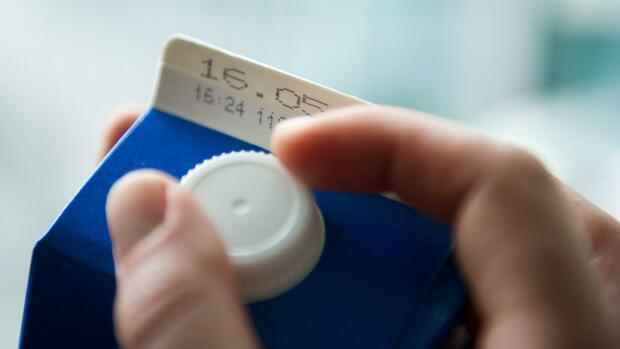Eliminating the use-by date could help fight food waste.
(Photo: dpa)
Brussels Every year around 80 million tons of food are thrown away in the EU, one fifth of total production, around 170 kilograms per person. If this amount could be reduced, the food could be made cheaper and at the same time relieve the pressure on agriculture.
One possible approach is to change the labeling on food. So far, most foods have a best-before date, others have a use-by date and some have no date at all. The EU Commission has drawn up several proposals as to how this information could change. She will soon start a consultation process, asking for the opinion of citizens, companies and associations.
In order to understand the proposals, it is important to know the previous legal situation. Because even now not every food has a date.
- Most foods wear in Best before date (Best before), up to which the manufacturer guarantees that the goods will retain their properties if stored correctly. It is often not a problem to eat food after the date has passed. It can then even be sold. It depends more on whether the product still looks and smells fresh.
- Easily perishable goods such as fish, meat or sliced salads enter Use-by date. This date should be taken seriously because consuming it after the date can make you sick.
- Carry a lot of unpackaged foods like fruits and vegetables no date at all, as well as particularly long-lasting foods such as salt or wine.
Top jobs of the day
Find the best jobs now and
be notified by email.
It is up to the manufacturer which data is given for consumption and best before date. Many laws relating to the production and sale of food are to be revised in the coming months.
The strategy behind it is called “From farm to table” or “From farm to fork”. It should be about security of supply, about the reduction of pesticides and fertilizers, measures against fraud, better animal welfare and also about the reduction of waste. A change in best before dates is one of the few levers the EU has to reduce food waste.
The EU Commission is putting the following proposals up for discussion:
1. The best before date is abolished on long-lasting products, so pasta, rice, coffee and tea.
2. The best before date is also abolished for all other foods. All that remains is the use-by date. It remains to be seen whether this date would then be printed on more products than before.
3. The data will be presented in a different way. “Best before” and “To use by” could be replaced by other terms, or they could be supplemented with symbols or other information. In the English language, the term “best before, often good after” is given as an example.
The third proposal is very much about the translation into the 24 official languages of the EU. This is shown by a Eurobarometer survey from 2015. It shows that there are big differences in how well EU citizens understand what the data say.
Depending on the country, 12 to 68 percent of citizens understand the best-before date correctly. 71 percent of Greeks understand the message of the use-by date, but only 13 percent of Germans.
Fruit and vegetables have always been offered without an expiry date. Other foods could soon follow suit.
(Photo: imago images / Westend61)
Another suggestion comes from the Center for European Politics (CEP) in Freiburg. In a study, the institute suggests providing both data on as many products as possible. “This would inform consumers about both aspects – food quality and food safety – and, at least as importantly, would greatly reduce consumer confusion about the meaning of the two dates,” it said. “This is the best way to avoid misunderstandings and food being thrown away too early,” says study author Patrick Stockebrandt.
The EU Commission does not explicitly rule out the fact that the previously applicable rules remain unchanged.
But that doesn’t seem particularly likely at the moment. Politicians see the need for a new version: “A change in color or consistency or an atypical smell of food are signals that a product should no longer be consumed,” says CDU MEP Christine Schneider. “This applies to the time before and after the expiry date. Products don’t simply go bad the day after they expire. ”There is no need for a date“ that doesn’t bring anything to anyone ”.
Schneider also complains that supermarkets throw away products just because the best-before date has expired. “The situation in which people get edible food out of containers shows how urgently we have to act.”
More: With these ideas, companies are turning waste avoidance into business
